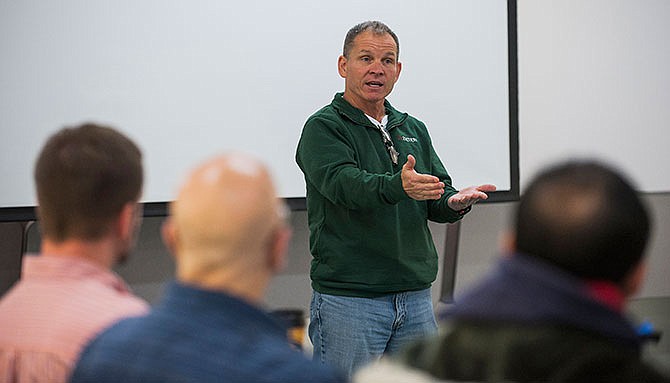COLUMBIA, Mo. (AP) - Dan Hanneken sums up the work he does helping people recently released from prison readjust to society with a simple phrase.
"When I go home tonight, my hope is my TV is still in my living room," he said Thursday morning at the quarterly meeting of the Boone County Offender Transition Network, or BCOTN. The group, made up of people from the Missouri Department of Corrections, Probation and Parole, counseling agencies and other local entities, works with offenders and the community to increase the chances of success for people released from prison.
The Columbia Daily Tribune (http://bit.ly/1K7o3Hv) reports that every year, the Missouri Department of Corrections releases thousands of people from custody, most on probation or parole. During fiscal year 2015, which ended June 30, the corrections department released 19,145 people, according to its annual offender profile. As of June 30, a total of 899 people were in prison on sentences out of Boone County and another 1,651 were on probation or parole.
The goal for Hanneken and the people who attend BCOTN meetings is simple: reduce recidivism among ex-offenders. During one meeting the group listened to presentations on employment opportunities for felons and other offenders from Job Point's Gary Taylor, Stephen Carter with Missouri Vocational Rehabilitation and Ken Chapman, a re-entry coordinator with the Missouri Department of Corrections.
Taylor said Job Point offers four training programs that accept people with criminal records. The programs, which have tuition costs that can be offset by scholarships, focus on highway construction, office technology, young people interested in construction and heating, ventilation and air conditioning. Each program is 16 weeks or less, Taylor said, but the sessions often go unfilled.
"I have trouble filling these classes," Taylor said to the group. "That's a shame."
People who finish the programs obtain national certifications and can land jobs making more than $20 an hour in some cases. Taylor called the programs "a quick way to change a legacy" for troubled people and "a quick way to change a family."
Chapman played excerpts of two interviews he did with people who had been released from prison: a man who had been incarcerated several times and a woman who completed a short prison stint and never returned. Many people released from prison feel helpless and without value, he said, making them not want to abide by the law. Most have never had any support or help from others. Sometimes, he said, something as simple as listening to them can go a long way.
"We have offenders getting out" who "just want to be heard," Chapman said.
A former convict himself, Hanneken spent nearly 10 years in prison over three stints for crimes including stealing, robbery and assault. Since his last release in 2003, Hanneken earned a master's degree in social work, joined BCOTN and founded In2Action, an agency that helps convicts and at-risk people who have substance abuse issues. In the past year, he said, the transition network's biggest advantage has been sharing information among different agencies.
Lack of employment is the main barrier to success for someone who is released from prison, Hanneken said after the meeting. Other factors include housing, transportation, substance abuse and the stigma of having been locked up, he said. It's important to help people who are released from prison successfully reintegrate into the community, he said.
"Unlike other populations in our community, when offenders are not successful there are usually victims involved," Hanneken said.
Information from: Columbia Daily Tribune, http://www.columbiatribune.com

